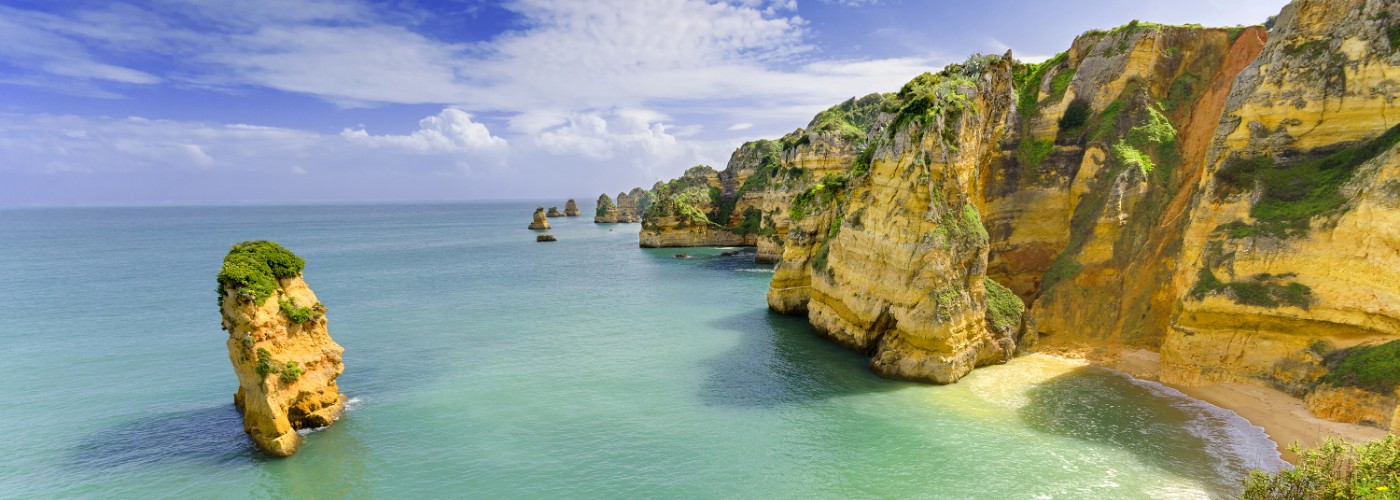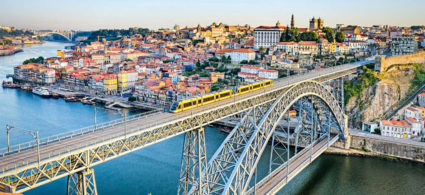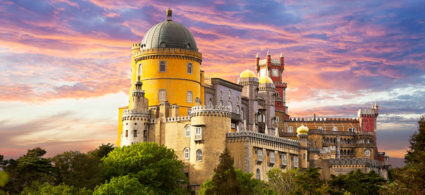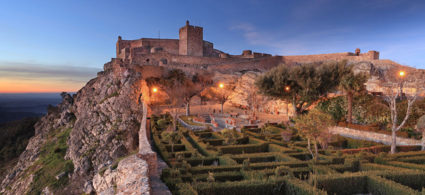

Portugal is a country of strong traditions and proud and nostalgic people, capable of charming famous writers and directors like Lord Byron, Wim Wenders and Antonio Tabucchi, as well as an increasing number of tourists.
Romantic cities like Lisbon, Porto and Sintra seduce visitors with their beauty and their atmosphere, while the moving notes of fado, the traditional Portuguese music, touches the memory and the heart of whomever listen to it.
The sea is a great protagonist of every holiday to Portugal; the main beach destination is the Algarve, but do not despise the inland regions which are also very interesting to visit. They are an endless source of attractions among castles, medieval towns, religious hikes, natural parks, vineyards, and wine cellars.
There is a young side of Portugal full of energy and desire to make things happen. This country is a paradise of surfers, of lively nightlife, colourful graffitis scattered all over Lisbon, and numerous outdoor music festivals.
Portugal enjoys a mild climate, with temperate temperatures throughout the year, so you can visit in any season.
The best times to go to Portugal are spring and autumn because flight and hotel prices are lower than in summer and there is less confusion; it is usually warm enough to stay on the beach.
The fastest and cheapest way to get to Portugal is by plane: for Lisbon and Porto there is a good choice of low cost flights departing from several European cities.
Also for the Algarve (Faro airport) it is possible to find many direct flights, but in many cases these are seasonal flights operating only during the summer.
There are things to see in Portugal for everyone: romantic souls, intrepid youngsters, playful children and placid old people.

Everyone who has visited agrees: Lisbon is one of the most beautiful cities in the world, a unique mix of melancholic charm, proud elegance, evocative decadence, young cultural ferment, modernity and wild nightlife.
The best way to visit it is to get lost in its narrow streets or take a ride on the historic streetcar 28, while for wonderful panoramic views of the city climb to the top of Castelo de Sao Jorge. Delight in a pastel de nata at the legendary pastry shop in Belem, let yourself be enchanted by the passionate notes of fado, turn a glance towards the ocean dreaming of distant destinations like the great navigators of the past.
With an incredible amount of cultural attractions and historic districts each with its own identity, all to be visited, Lisbon will steal your soul.

With its impressive gorges, green expanses planted with vines, traditional villages and of course the river that crosses the region to flow into the Ocean, the Douro Valley is one of the most fascinating areas of Portugal and the most important wine region in the country.
The most suggestive way to visit it is a boat trip on the river departing from Porto, an exuberant and melancholic city that deserves a visit of at least two days.
After visiting the city’s cultural attractions (don’t miss the Cathedral and São Bento Station), cross the iconic two-level Dom Luis I Bridge to reach Vila Nova de Gaia, visit a traditional winery and sip a good glass of port wine.

Despite being one of the most touristically developed regions of Portugal the Algarve, the southernmost region of Portugal, has managed to keep its wild charm intact. Even in the summer months, with the most famous beaches invaded by tourists, you can find a corner of peace from which to admire breathtaking landscapes and romantic sunsets over the ocean.
Do not miss the cliffs of Cabo San Vicente near Sagres, the towns of Lagos and Tavira and the Ria Formosa natural park.

Home to Portugal’s oldest university and the country’s former capital, Coimbra is a cultured and elegant city, rich in historical and cultural attractions.
It is an ideal city both for those who want to fill up on museums and monuments and for those who want to slow down the pace of their vacation and enjoy relaxing walks along the river or in the city center.
For young people Coimbra is a must-see thanks to its lively nightlife.

A day trip from Lisbon that you shouldn’t miss is to Sintra, a romantic town surrounded by the greenery of a natural park, where you’re likely to leave a piece of your heart.
Sintra’s most famous attraction is the fairy-tale Palacio da Pena, a castle with pastel-colored walls perched atop a vertiginous green hill with breathtaking views of the ocean, which has become the town’s symbolic image.
Many tourists limit themselves to the castle and its vast garden, but we recommend that you stay in Sintra longer and also visit the Palacio da Vila, the Quinta do Regaleira, the Castelo dos Mouros and the Convento dos Capuchos.
In Portugal, public transport works quite well, especially in the Lisbon district, so it is easy to move between the main locations by bus or train.
Unfortunately, it is not as easy to reach traditional villages, wild and remote beaches (which are often the most beautiful) or attractions in rural areas: to make the most of your time in Portugal you should rent a car.
A car itinerary in Portugal will give you the freedom to move at your own pace and stop wherever you like. 4-5 days are sufficient if you stay in a specific area, for example the Lisbon district or the Algarve, but we recommend at least a full week to visit more places at your leisure.
For a classic tour of Portugal that allows you to visit the most beautiful cities, the most important monuments and the coast of the Algarve you need at least two weeks.



With its mild climate and picturesque beaches overlooking the Ocean, Portugal is perfect for a beach vacation.
The most popular area for a beach vacation in Portugal is the Algarve, a region that boasts spectacular beaches surrounded by incredibly beautiful natural scenery and a wide variety of hotels and vacation homes to suit all budgets.
Another area rich in beaches is the district of Lisbon, in particular the stretch of coast between Cascais and Estoril. Very beautiful are the beaches which fall within the territory of the natural park of Sintra-Cascais, including the famous Praia do Quincho.
Less known to international tourists is the Costa Verde, in the north of Portugal: a vacation in this area allows you to combine days of relaxation on the beach, visits to cities and historic villages and maybe even an excursion in the rural hinterland.
If you’re willing to go further afield, head to the remote and fascinating Portuguese islands in the Madeira and Azores archipelago.
Overlooking the Atlantic Ocean on the Iberian Peninsula, Portugal is the westernmost nation in continental Europe and also includes the archipelagos of Madeira and the Azores.
Portugal is on the same time zone as London (UTC+1 in daylight saving time). The Azores, which are further away, are two hours behind us and therefore one hour behind mainland Portugal.
The telephone code of Portugal is +351: to call a Portuguese number from the rest of Europe it is necessary to dial the prefix 00351 before the recipient’s number.
The flag of Portugal, adopted on June 30, 1911, is composed of two colors and a symbol: green, which symbolizes hope, occupies 2/5 of the background, while red, which occupies 3/5, represents the blood of the fallen. The symbol between the two colors is an armillary sphere with the traditional Portuguese shield superimposed.
The currency of Portugal is Euro. Before January 1, 1999, the day the Euro came into force, the national currency was the Portuguese Escudo, replaced by the single currency with an exchange rate of 200.482 to 1.